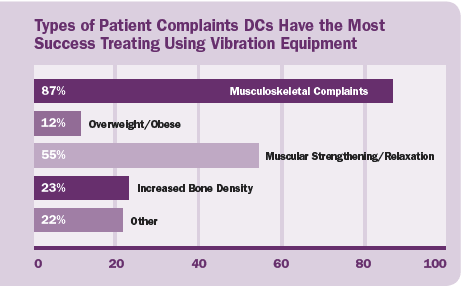It’s a new year and many chiropractors are evaluating what will enhance their respective practices, particularly as it relates to their bottom line. One of the most common questions I get is: “Do I need to be credentialed to bill insurance, and what are the best plans to join?” It’s a loaded question – but one every DC ponders. Whether you're already in-network or pondering whether to join, here's what you need to know.
What You Tell Us About Vibration Equipment and Your Practice
Vibration equipment is a relatively new option for doctors of chiropractic to add to their clinic. While many DCs have a poor understanding of vibration therapy, proponents say that this equipment fits nicely into modern practices and can be very good source of referrals. In a recent online survey of both users and nonusers of this equipment, 93 percent of DCs who use vibration equipment would recommend it to other doctors, which is a highly enthusiastic result.1 Nearly half (47 percent) have seen resultant patient referrals, which is a very strong outcome.
Users: Impact on Practice
Those who use vibration equipment in their practice do so to address a variety of patient needs, the most cited of which are musculoskeletal complaints:
Approximately two-thirds of DCs who use vibration equipment reported that it increased patient satisfaction with their care. A further review of those doctors who had increased patient referrals reveals that the incidence of increased referrals differs based upon the patient needs being addressing with the equipment.
For example, 40 percent of those doctors who utilize their vibration equipment for overweight/obese patients experience increased patient referrals. When used for increased bone density, 32 percent of DCs enjoyed increased referrals. The percentage of doctors who experienced increased patient referrals seems to fall as the application of the vibration equipment gets closer to a chiropractic focus. For example, muscular strengthening/relaxation was at 16 percent and musculoskeletal complaints was at 11 percent.
Ninety-three percent of those who use the equipment in their practice would recommend it to other DCs. When asked why, 66 percent cite that the use of vibration equipment has been very effective as part of their treatment strategy. Forty-seven percent note that patients have referred others as a result of their experience with the equipment. Additionally, 18 percent report that the reputation of their practice has increased.

Trial and Interest
Lack of information and understanding tends to be the hurdle that prevents most DCs from making a decision regarding vibration equipment. Only 59 percent of DCs have even tried the equipment, with another 11 percent who would like to try it. Sixty-four percent of chiropractors have considered adding vibration equipment to their practice. Interestingly enough, more than one-third of the DCs who are planning to add the equipment to their practice have yet to try it themselves.
Understanding Science and Patient Benefit
Both the science and the potential benefits of vibration equipment are not well understood by doctors of chiropractic. Only 26 percent of respondents believed they had a very good understanding of the science behind the equipment. A larger number, 31 percent, believed they had a very good understanding of the patient benefits involved. This uncertainty is even more pronounced in the responses of the non-users.
Looking deeper at the level of understanding different doctors have regarding the science, there is a definite trend away from musculoskeletal applications. Eighty percent of those doctors who used the equipment for overweight/obese applications understood the science "very well." The percentage of those who understood the science "very well" declined to 71 percent for those who used the equipment for bone-density applications, 57 percent for muscular strengthening/relaxation and only 48 percent for musculoskeletal complaints.
The same held true for doctors' level of understanding of patient benefits. Ninety-three percent of doctors who used the equipment for overweight/obese applications understood the patient benefits "very well." The percentage of those who understood the patient benefits "very well" declined again to 71 percent for those who used the equipment for bone-density applications, 70 percent for muscular strengthening/relaxation and 60 percent for musculoskeletal complaints.
Non-Users: Why Not?
When asked why they didn't utilize vibration equipment in their practice, non-users were divided in their answers. The largest response (35 percent) was actually "Other." In review, more than 60 percent of these "other" fill-in answers related to a lack of information or understanding about the benefits of vibration equipment. Answers ranged from "I have no idea what it is" to "Questions about applications and effectiveness." Many respondents remarked "Don't know enough about it." Twenty-three percent stated that the equipment didn't fit their practice style. Seventeen percent believed the equipment was too expensive, and 10 percent didn't see enough benefit to their patients.
Conclusion
There is a clear lack of understanding regarding the science and potential patient benefit related to vibration equipment, particularly as it applied to musculoskeletal complaints. Doctors who are considering this equipment for their practice should talk with other DC users, but also take the time to read and understand the research relating to this form of care.
Reference
- Vibration Equipment Survey. MPA Media, completed March 31, 2010.


